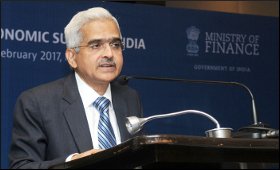|
|
|

|
Economy likely to see gradual recovery: RBI Guv
|
|

|
|
| Top Stories |
 |
|
|
|
SME Times News Bureau | 16 Sep, 2020
The recovery of the Indian economy reeling from the impact of the
Covid-19 pandemic will be gradual, RBI Governor Shaktikanta Das said on
Wednesday.
Addressing the FICCI National Executive Committee
Meeting, the central bank chief said that the country is still reeling
under the impact of Covid-19 and will gradually come back on normal
growth path.
He, however, said that things have considerably
improved in the second quarter after adverse impact the pandemic had on
economic activity in the first quarter.
"Nevertheless, high
frequency indicators of agricultural activity, the purchasing managing
index (PMI) for manufacturing and private estimates for unemployment
point to some stabilisation of economic activity in Q2, while
contractions in several sectors are also easing," he said.
"The
recovery is, however, not yet fully entrenched and moreover, in some
sectors, upticks in June and July appear to be levelling off. By all
indications, the recovery is likely to be gradual as efforts towards
reopening of the economy are confronted with rising infections."
According
to Das, financial market conditions in India have eased significantly
across segments in response to the frontloaded cuts in the policy repo
rate and large system-wide as well as targeted infusion of liquidity by
the RBI.
"Despite substantial increase in the borrowing
programme of the government, persistently large surplus liquidity
conditions have ensured non-disruptive mobilisation of resources at the
lowest borrowing costs in a decade," he elaborated.
In August
2020, the yield on 10-year G-sec benchmark surged by 35 basis points
amidst concerns over inflation and further increase in supply of
government papers.
Following the RBI's announcement of special
open market operations (OMOs) and other measures to restore orderly
functioning of the G-sec market, bond yields have softened and traded in
a narrow range in September.
"Although bank credit growth
remains muted, scheduled commercial baks' investments in commercial
paper, bonds, debentures and shares of corporate bodies in this year so
far (up to August 28) increased by Rs 5,615 crore as against a decline
of Rs 32,245 crore during the same period of last year," he said.
"Moreover,
the benign financing conditions and the substantial narrowing of
spreads have spurred a record issuance of corporate bonds of close to Rs
3.2 lakh crore during 2020-21 up to August."
Besides, he pointed
out that the immediate policy response to Covid in India has been to
prioritise stabilisation of the economy and support a quick recovery.
Citing World Bank assessment, Das said that recovery globally would take a longer route as it is not fully entrenched.
|
|
|
| |
|
|
|
|
|
|
|
|
|
|
|
|
|
|
| |
| Customs Exchange Rates |
| Currency |
Import |
Export |
US Dollar
|
₹91.35
|
89.65 |
UK Pound
|
₹125.3
|
₹121.3 |
Euro
|
₹108.5
|
₹104.85 |
| Japanese
Yen |
₹58.65 |
₹56.8 |
| As on 19 Feb, 2026 |
|
|
| Daily Poll |
 |
 |
| What is your primary "Make or Break" expectation from the Finance Minister this year? |
|
|
|
|
|
| Commented Stories |
 |
|
|
|
|
|
| |
|